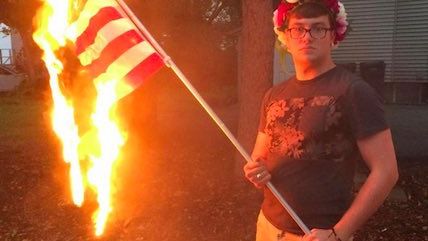Illinois Cops Arrest 22-Year-Old for Flag Burning, Then Remember They Can't
'Citizens should not permit them to evade responsibility,' says First Amendment lawyer Ari Cohn.


An Illinois 22-year-old was arrested after burning the American flag and posting the pictures on Facebook. People who saw the pictures called the Urbana Police Department, and the cops showed up to arrest Bryton Mellott on Monday morning.
He was then booked into jail—ostensibly for violating Illinois's prohibition on flag-burning, and for disorderly conduct.
Mellott, who self-identifies as "part of the queer community," wrote on Facebook that he was ashamed of the atrocities committed by the U.S. against "people of color, people living in poverty," and other identity groups.
A representative for the police department told Forbes:
The free speech that he was exhibiting, while it was distasteful to some, free speech is free speech," Charles told me. "It's when you say things that are inciteful and make it clear that you are associated with someone that doesn't share your ideas; it got raised to a level where a reasonable person there would fear for their safety. It's similar to yelling fire in a movie theater."
This, of course, is nonsense. Burning the American flag is protected political expression, plain and simple—even if it makes other people feel unsafe. (Don't even get me started on the lazy, inappropriate use of the fire-in-a-crowded-theater example.) The Supreme Court has repeatedly and explicitly upheld the right to burn the flag.
Thankfully, the Urbana Police Department finally got around to remembering this fact. Mellot has been released, and will not face charges. But the cops are still pretty proud of themselves for arresting him:
"Laws dealing with questions of Constitutional rights are extremely complex. The Urbana Police Department recognizes that this is a case where the right of free speech may have been in conflict with the safety of innocent and uninvolved citizens. Our officers strive every day to achieve a balance between public safety and preservation of Constitutional rights. In this circumstance, our officers acted in good faith and in reliance on a state law that was passed by our legislature in an attempt to do just that. We respect the analysis of the State's Attorney's Office and their determination not to proceed with the prosecution in this matter."
Ari Cohn, a First Amendment lawyer and alumnus of the University of Illinois at Urbana-Champaign, disagrees that police intervention was either prudent or necessary.
"To meet the legal standard for incitement, speech must encourage imminent lawless action. Mellot's Facebook posts clearly did not," wrote Cohn in an email to Reason. "Nobody had anything to fear from Mellot's posts showing him burning the flag and explaining what he believes the problems with our country to be."
Cohn continues:
One must also wonder, given the protestations from the police that they did not arrest Mellot because they were offended by his speech, why he was charged with flag desecration at all. If the issue truly was safety, what purpose does the desecration charge serve? The series of events and justifications reeks of a police department failing to own up to their grievous mistake.
If the Urbana police were concerned about the threats made against Mellot or his employer, the proper, constitutional, response would be to deal with those making the threats. Instead, on the very day we celebrate the freedoms our nation guarantees, they chose to arrest someone for exercising one of the most precious rights we hold. That is deeply lamentable, and citizens should not permit them to evade responsibility.
In a free society, people have just as much of a right to criticize their nation as they do to celebrate it. Allowing them to burn the flag on the Fourth of July is an easy test of our commitment to the principles of the First Amendment. No matter how offensive, unsafe, or dangerous this act may seem to some, it is nevertheless protected by the Bill of Rights: the same document that guarantees all of Americans' other, equally essential liberties.
Of course, many politicians express a routine desire to abridge the First Amendment and prohibit desecration of the flag. One of them is the presumptive Democratic Party presidential candidate: Exactly 10 years ago, then-Sen. Hillary Clinton—who has an abysmal record on free speech issues—launched an effort to outlaw flag-burning.


Show Comments (128)